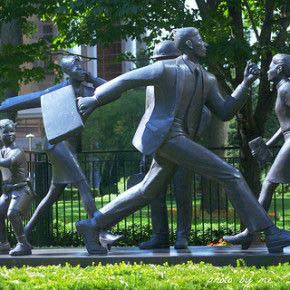Individual Psychotherapy: A Golden Age of Workaholism 2

Given the current epidemic of workaholism, it’s an issue for individual case studies to take very seriously.
We need to understand as much as possible about how it can possess and consume the lives of individuals.
If we take workaholism seriously as a form of addiction, what does that imply for the way we look at compulsive working?
Workaholism as Addictive Self-Medication
If workaholism is a form of addictive self-medication, we need to think about it in terms of one of the key cornerstones of addiction therapy. That is the principle that you will never get a person to give up an addiction, unless we understand what the addiction actually does for the individual, and help him or her to find another way of meeting that psychic need.
“Presenteeism”
Prof. Ruth Simpson of Brunel University has described a phenomenon she calls “presenteeism“. In addition to the tendency to come to work when one is ill and shouldn’t be there, Prof. Simpson characterizes it as “”the tendency to stay at work beyond the time needed for effective performance on the job”.
Is working endlessly a form of self medication? It most surely can be, by performing several functions for the individual. Two primary things it does are as follows.
1) It allays my anxiety by giving me the feeling that I’m exerting additional control over the work load.
2) It assures me that, through my satisfyingly virtuous performance, I am doing more and better than the others. No one is putting forth the effort that I am.
Work and the Hero Archetype

Heroic Work: Hercules Cleaning the Augean Stables
The workaholic, whose work is never done, strives to accomplish the superhuman, the Herculean, the task beyond mere human doing — more…better. As such, the he or she is in the grip of a monstrous inflation. He or she is identified with the hero archetype.
True heroes aren’t human. Ulysses, or Achilles or Hercules — or Luke Skywalker or Harry Potter — are beings from myth. When we try to literally live hero out in human life, as the workaholic does, we set ourselves up for a potentially tragic outcome. As James Hillman has it:
“…the hero then, in a living world of gods, and the heroic today are two very different cases….
Then he [sic] was half-man and half-god, but when the gods are dead, the hero becomes all too human…. Today, cut off from this psychic background, the heroic becomes the psychopathic: an exaltation of activity for its own sake.“
“Exaltation of activity for its own sake” — could any phrase better characterize workaholism?
Freedom in the Self
Healing from workaholic compulsiveness involves the kind of self-acceptance that allows persons to be free and adequate in themselves. To truly be oneself, in the awareness of one’s own self and life as enough, is no small thing: it is the root antidote to compulsions to be god-like or superhuman in competence. Such self-acceptance is the goal of the journey of individual case studies.
[cta]

